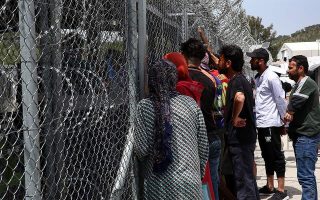Social inclusion of migrants in Greece still piecemeal

Most of Greece’s migrant population of 550,000 people has lived in the country for more than 15 years yet still faces significant insecurity in obtaining a long-term residence permit that will give them equal rights with other European Union citizens.
According to the Greek Forum for Migrants, of a total of 550,822 foreign nationals who have some form of permit, the majority come from five countries: Albania (357,472), Georgia (22,869), Pakistan (19,009), Ukraine (18,328) and Russia (14,878). Of them, 50 percent are officially registered at the Ministry of the Interior and have a 10-year residence permit, which, however, has been abolished.
Once their papers expire, they will have to apply for a simple three-year permit that grants them limited right or the five-year permit that is also recognized by the European Union so that they can continue to live in the country legally, a process that is both costly and unnecessarily lengthy, often resulting in papers being expired for several months before new ones are issued.
In order to apply for citizenship, though, they need to have proof of residence in the country for seven consecutive and uninterrupted years.
According to the latest data, some 230,000 migrants have three-year permits and just 28,248 have the five-year permit that allows them to work in another EU member state and grants them equal rights as EU citizens.
The forum notes that unnecessarily complicated procedures form a serious obstacle to assimilation and also point to an absence of a comprehensive immigration strategy.
“What [the authorities] fail to understand is what it means for migrants to be in a state of limbo, waiting to ‘enjoy their rights.’ We have become accustomed to living ‘half a life’ and that is a problem that does not just concern us, but Greek society as a whole,” the director of the forum’s Greek office, Adla Shashati, said at a press conference on Wednesday, which was International Migrants Day.
According to the forum, 99,400 of the immigrants who are officially registered are minors and 150,000 of the total are 50 years old or above.
“We continue to deal with problems in almost every issue concerning second-generation migrants,” said Shashati. “Here, too, there is an absence of strategy and planning for the social assimilation and inclusion of children who came to the country at a very young age.”





